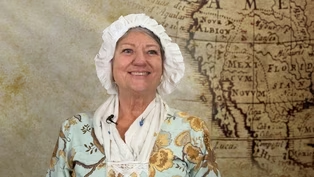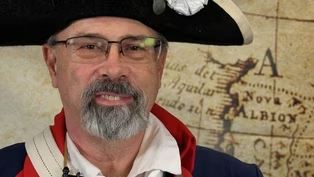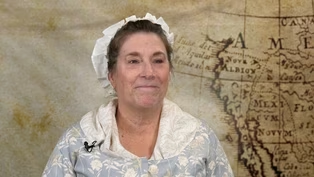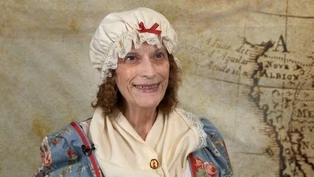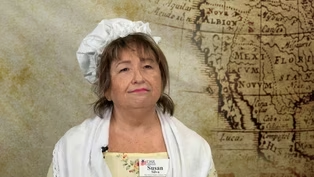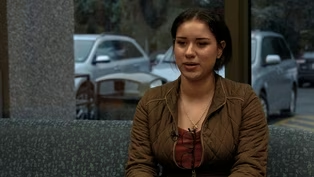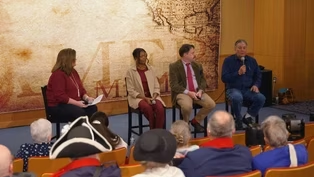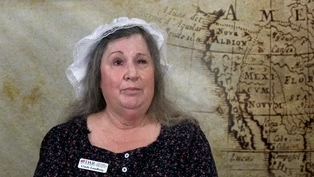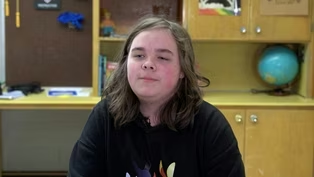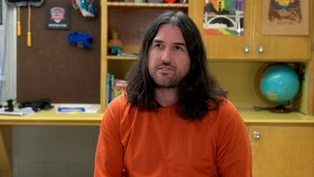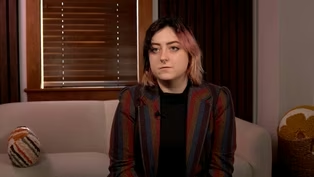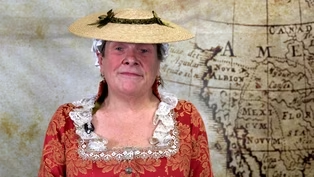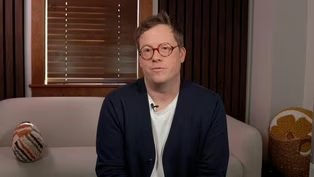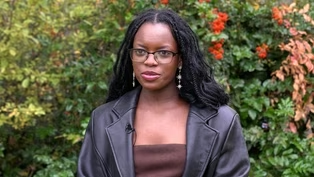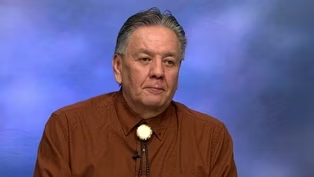KSPS Presents
What Does Liberty Mean to Me?
Special | 51m 22sVideo has Closed Captions
Community leaders discuss the evolving meaning of liberty and addressing current political divides.
As America prepares to celebrate 250 years of independence, we invite our community to think about the question: What does liberty mean to me? Community leaders joined host Dana Haynes to discuss the evolving meaning of liberty and how liberty's ideals can address current political divides. Thank you to our panelists for providing a thoughtful evening of conversation.
Problems playing video? | Closed Captioning Feedback
Problems playing video? | Closed Captioning Feedback
KSPS Presents is a local public television program presented by KSPS PBS
KSPS Presents
What Does Liberty Mean to Me?
Special | 51m 22sVideo has Closed Captions
As America prepares to celebrate 250 years of independence, we invite our community to think about the question: What does liberty mean to me? Community leaders joined host Dana Haynes to discuss the evolving meaning of liberty and how liberty's ideals can address current political divides. Thank you to our panelists for providing a thoughtful evening of conversation.
Problems playing video? | Closed Captioning Feedback
How to Watch KSPS Presents
KSPS Presents is available to stream on pbs.org and the free PBS App, available on iPhone, Apple TV, Android TV, Android smartphones, Amazon Fire TV, Amazon Fire Tablet, Roku, Samsung Smart TV, and Vizio.
Providing Support for PBS.org
Learn Moreabout PBS online sponsorshipAs we have, titled this discussion.
What does liberty mean to me?
We're going to just ask that question to each of our panelists.
This is a good way for you to get to know these panelists.
We told you about them at the beginning, but, their level of, expertise, their level of experience, I think will really lend, a great way to get this conversation going.
So let's just start Lisa, What does Liberty mean to you?
That was my fear that I would be the first one that, Oh.
So, Yeah, I'll take one for the team.
As you can imagine, as, a black woman in the United States, it can be very layered.
And, you know, listening to my girl Abigail Adams and what she had to say, like.
Yeah, no, don't forget the ladies, you know?
And so I often, you know, think about when I walk into a room, do I walk in as a woman or do I work in as a black person, or do I walk in as both and and that is what it is.
I am walking in as a woman and a black woman.
So it's kind of layered on what liberty means to me, because it took a long time.
The women's suffrage had to happen, you know, and so there's that kind of victory.
But then there's also the civil rights movement.
And what happened with that.
But as it pertains to just the foundation and the fundamentals of our country, it means to be human to really have complete humanity and be free with that, to be free to breathe air, to have freedoms, to walk along, you know, the streets and the freedom to sing and dance and be joyous in life.
And I think that that was literally what our forefathers of this country was really looking for.
But of course, I feel this kind of angst because now my people, my ancestors, they weren't free, but they were definitely on the battlefields fighting with this country.
And I, I tell people all the time, black people are very patriotic, if you think about it, from the very beginning, the Revolutionary War, civil rights, they were the Civil War.
They were definitely out there fighting for liberty, fighting for this country.
Because if for nothing else, there are people who understood what it meant to have that liberty after being so oppressed.
So imagine what that meant to them.
What liberty really is.
It is to escape oppression.
So liberty means to me is that to really be free of that oppression?
You, I'm going to start by not answering the question.
So things already gone off the rails.
It's entirely my fault.
I'm, you know, I'm here as a historian, so I'm going to, talk about what I think the founders meant, or or were thinking about or the, the intellectual universe in terms of what they meant by liberty.
And I think that meant the absence of arbitrary rule, which basically means the rule of law.
So when they were talking about liberty, it was to not be subject to just random choice of, of a tyrant or whoever it happens to be, so to have the rule of law.
But of course, the paradox is, which is what I think is going to run through most of our discussion and hopefully a little bit more strongly throughout the series, is almost everybody who lived in colonial America lived subject to, arbitrary rule only male heads of household could ever hope to achieve that kind of liberty for themselves, and that that's the kind of ongoing project.
So I'm just going to I'm going to cut it there.
Warren.
Thank thank you.
First let me begin for, thank you for inviting me.
And thank everyone for showing up this evening.
From my perspective, it comes more from a Native American perspective.
And I was curious when I had heard about this film to see how much and they were going to include Native Americans into the conversation.
So when you start to talk about liberty, and in the beginning, they opened up and then I didn't hear anything else.
Maybe in the six part series we'll get more, but it amazes me.
How often when I when I do speak to groups such as this or other types of groups, how little people truly know about the Declaration of Independence and then everything that followed that.
So for Native Americans in 1776, we were sitting here and we truly had liberty before anyone else showed up.
We were not told what we could do.
We just did it.
We were free to be who we wanted to be.
And then as things changed on the East Coast, now you got to remember in 1776 we only had the horse for 30 years or 40 years, and then by 30 years after that, then the first non Indian arrived.
And that's when our liberties started to be taken away.
You know, in my head, and as I go through the conversation tonight, America's.
The American immigrants who came to this continent, they built their life, liberty and pursuit of happiness upon the lives of the Native American.
And they took away.
Our liberty.
And they took away our happiness.
So America, to gain that, took that away from the Native American.
And so I see it, you know, as the country moved across, I see it in a completely different light, because I know of all of those other things that took place that are not found in the history books.
Now, as far as what this film I think is going to do, I think is going to be interesting when they when I saw this video, I thought, okay, it's very kind.
It's very kind.
And I'm hoping that when I see the larger part of the six part series, that it's going to really show the in depth that people dig, sacrifice.
And you don't always get that through kindness because America was not built on kindness.
What we have today was not built on kindness.
And I'm going on a little bit longer than I. I think I should, but for me, liberty is something that we will always try to achieve.
We will never truly be there, but we will always try to achieve it.
And as long as we can do that as a group of people listening to one another, taking into consideration what that other person truly believes, we will inch towards liberty.
You don't worry about going too long.
Perspectives from all three of you are important tonight and so don't don't worry if you feel like you're going a little long.
The American Revolution was driven by enlightenment era, ideals.
So liberty, as we discussed, equality, self-governance and the belief that ordinary people had the right and duty to shape their own government.
How do you, you guys think these founding ideals, threatened by continued practices of slavery and colonization and what they were doing to the Native Americans at that point?
So kind of discuss how these ideals kind of countered with with some of the practices in place.
Yeah, it seems fair, right?
You went first last time.
Well, I'm not sure that the enlightenment actually did many of those things.
And the enlightenment is a very diverse, sort of general movement.
And there's all kinds of things in there.
There's some things that we like now, such as, like Liberty and, you know, before you with the civics poll, we had John Locke up there.
Right?
Everybody loves John Locke.
He's America's philosopher.
But guess what?
He so he he's the guy who Jefferson cribs and the Declaration of Independence, right?
Life, liberty, and the pursuit of happiness.
He said pursuit of property.
Today we will call that plagiarism.
And, he would be in trouble at WSU.
But what John Locke also did was write the fundamental laws of the Carolinas a little bit earlier, which was basically a feudal, constitution for what is today North and South Carolina.
So John Locke was kind of a hired gun.
He would write whatever you wanted.
Not just Duncan, John Locke, but also what comes out of the enlightenment is the beginnings of the origins of scientific racism.
So Immanuel Kant, for example, writes about that, which I think, you know, I guess come back to the real spirit, the question which is about, you know, basically the US, you know, we're not living up to these ideals, right?
The founders were not living up to these transcendent ideals.
Well, yeah.
And I think that that is interesting.
Right.
So a number of you are wearing the The White People t shirt, I think the volunteers.
And thank you all for your work.
I think the question is like, who are the people?
I mean, that was the real the fundamental question of the revolution, because if you were considered in, then you got liberty.
And if you weren't, then you didn't.
So, you know, that contradiction is that from the very beginning?
For me, I think it goes back to the wording, you know, that the enlightenment period and the wording that they put in to both the, Declaration of Independence and the, Constitution.
I think when they were writing that, they hoped it would be further.
But as we know when it says we the people and all men are created equal as we know it, that that wasn't the case.
It was white, wealthy, landowning men.
Women came later, natives came later, other races came later.
If and they're still pursuing that.
And I think.
What we have to do is as America is revisit.
That's what I had to do.
I'm going to be honest.
I had to reread the Declaration of Independence and it was, oh my gosh, what they fought for during the enlightened period was what it feels like is occurring all over again today.
The problem is, is back then, your founding father fathers, they had that leadership qualities that the enlightenment period brought forth.
And today I'm not so sure about that because we're so divided.
We are so divided.
And so I think we have to take a look back at what we what is in those documents and be honest with ourselves.
Because the reason I said this is a kind film.
Is that we have to be brave enough today, which which I don't think we are to be able to listen to the other side because truth hurts and we don't want to be hurt.
And so that during that enlightenment period, that's when that we have to look back at that period of time and look back at our leadership and see how they propelled us forward.
It's a very, it's very loaded, you know, that that question in in that time because even I'm born and raised in Spokane.
So I went through all Spokane public schools and learning about the war.
And of course, it's I'm this little black girl in the classroom with Gertie.
Everyone else is not black.
And it's, well, where were my people at during this time?
So does this mean that we were considered equal when it says all men are created equal.
So I have to really battle with.
No, that doesn't include my people.
So it's this kind of elementary thinking of, okay, I have to come up with imagination that my people were equal at the time, but then get to high school and I went to Ferris.
So let's let's put that into context.
I went to Ferris and going to Ferris.
And same thing as you're now going deeper into history and you're learning more.
And now I'm starting to really learn my voice.
And I'm also starting to learn the truth.
Like, no, we were not even considered a man.
We weren't even considered people, and we were actually slaves at the time.
We weren't even considered during the writing of the Declaration of Independence.
So how do I take this and really say that this is about me?
How do I take this and say that I was being considered?
However, we do know for a fact that those were there was a slave.
They said it even in this documentary slaves.
And then the ones who were freed, all thought because they were believing in this hope of freedom and liberty.
And so it's that ideals of that liberty that we constantly, constantly fight for, not just in this country, but if we even look at it from different races, we're constantly fighting for that liberty.
We want to escape the oppression.
And it's something that we've not escaped from even in 2025, where we're constantly looking to get to a place where we're okay, I finally feel free.
And I think that, yes, those were the ideals, and that's what this country was built upon and when fought for.
But it's something that, again, even in 2025 and in especially in this very divisive, society, we're still fighting for.
In June of this year and again last month and last month, it might have even been bigger.
We we saw the no king's demonstrations.
Organizers and protesters, of course, oppose what they believe is authoritarian policies under the Trump administration.
And say that President Trump is behaving more like a monarch than elected officials.
In what ways?
It is this movement, similar to what went on with patriot uprising in colonial America?
And in what ways is it different?
Maybe we'll start, with Lawrence this time, since you're our historian, you might be able to shed some light.
I was first, last time.
This is.
Oh.
You were.
No, it's fine to shoot.
Well, we can move on to warrant.
Why did you know that?
I don't know, okay.
I'll just start by saying that the views expressed here are entirely my own and do not represent that necessarily of Washington State University.
That always.
That's always good, because then what comes next is.
Right.
Well, not necessarily.
Well, I thought about that question.
And though, one of the similarities for sure is that these are both about constitutional ideas, which sounds really abstract.
Right.
But when you read the Declaration of Independence, most of it is set up, as you know, a list of all the bad things that George the Second did, like he drank out of a milk carton and put it back in the fridge and things like that.
No, I shouldn't be late.
And there are some serious accusations there.
And the reason they did that is in part to do with John Locke, because, what the, Jefferson was doing was invoking this idea of the right of revolution.
That when the compact that creates government, the fundamental agreement that created government, when, you know, a leader violates that, then you have a right to revolution.
Which doesn't mean that I'm advocating revolution, but it was a constitutional question, right?
What could the king do in the colonies?
What could the Parliament do in the colonies?
Was sort of where this began.
And that was really unclear because, the British Empire didn't have a written constitution.
Great Britain still doesn't.
It has various bits and pieces and things like the Magna Carta, which you've heard of, parliamentary laws, just plain old tradition, like, oh, well, you know, we haven't done this for several hundred years, so I guess we don't do that anymore.
So, like King Charles the Third, right?
Theoretically could veto law, but that hasn't happened since Queen Anne, who was queen in the early 1700s.
So what's the point here?
Well, the point is that it seems to me that the the commonality with the note King's movement is, a push back against executive power.
So I'm not even going to mention, who the president is because it's it, you know, but but the question is fundamentally about what under the Constitution, what powers does the president have?
Which is a really long running theme in American politics.
Right.
Because that's what they were living against, George.
That, that that he was abusing executive power.
And this has an even longer history, sort of in Anglo-American political thought, that goes back into the 17th century, basically within Anglo-American thought.
And it's particularly associated with the idea of Whigs.
So in the 19th century, there's an American Whig party.
They take their name from these ideas from the 17th century, which is basically this idea that, kings or monarchs or leaders, are constantly going to try to accumulate power in their hands that this is just the way politics works.
So what you have to have is counterbalances, which the English Constitution was meant to have, but not good enough.
And that's why we end up having a revolution and why we try to find other ways to balance that power, which, you know, hopefully we all know, involve the branches of government which are meant to be co-equal.
So, you know, that's that's worth remembering that one.
Thank you.
Warren, does you want to tackle any piece of that?
So the, the similarities and I kind of went into this in my, my previous answer and I stand by that, that the similarities are within the declaration itself that what they were fighting for, pushing back on the king of, of Great Britain, was that there was military amongst the people, that there was taxes and tariffs, that was holding the people down and costing them more, that there was acts where he, the King, was sending to, arrest people if they were speaking out against the king.
And so, I mean, it is it is uncanny in to me of the similarities not all of the all of the list, but quite, quite a lot of the list.
And so it, I think this film, if it.
If it moves forward and it brings out a conversation, And we revisit that as, as a nation to get back to where we think both sides hope to be, to where we're talking to one another and be able to agree to disagree.
That's what we used to have.
And today we don't even we can't even do that because both sides are like this, you know?
And so to me, the similarities are right there in front of us.
Just they're listed out for us.
Lisa and I. Again, the views of mine do not represent the Spokane City Council or the NAACP.
I think we are a country that, we've always been about protest and and so a lot of things come out of protest and, and so you're seeing kind of the similarities to me as they were protesting and rebellion for their right for freedom.
And again, some of the civil rights movement, there was a protest, you know, it was a protest when it was George Floyd.
It was a protest when it snow kings.
A lot of things come out of that exercising that voice in.
These are rights.
And that's where I see the similarities of it.
As far as kind of I keep coming back to leadership is about trust in at the throne.
And so what I'm finding is that the people want to be able to trust who's leading them.
And so that's what we want.
And that's why you're seeing kind of the uprising of that.
We want to be able to trust who is leading us.
And if there's no trust, and we feel that this kind of executive orders that are just going to damage the people and and damage the Republic, we're going to protest and push back on that.
Yeah.
Great answers, great answers that no.
King's movement really, tackles more federal level, you know, issues.
That's what we're talking about.
But often local issues have a bigger impact on our actual day to day lives.
So how can citizens inspire local action or change in their own communities?
Is it with protest?
Is protest where you start?
Is there a different starting point?
Lisa, we'll start with you.
That's a very good question because it's something that we talk about constantly and keep, you know, it's what do we do?
How do we get involved.
And it's one thing to become a member of an organization, but it's another thing to get involved in the community.
And I tell people, and I'm not just saying this because I work for city council, but that really is where you go and you bang the table.
That's where you go and really make your voice heard.
Is being civic involved and making sure that you're understanding what your politicians locally are doing.
And I tell people all the time, especially in communities of color, don't think that your vote.
Does it mean anything?
Because it does.
It really means something.
Get involved in like your candidate forums, get involved with the League of Women Voters is phenomenal.
We had a candidate forum not too long ago and had all the city council candidates there.
I believe that candidate education policy, education is something that we need to really push forward, because what happens is that a lot of this falls on deaf ears, that people don't even listen to it anymore because they're so clouded by kind of the politics or a kind of clouded by something that's going on on a national level, when locally it's a lot of the stuff that's changing our everyday lives.
And so it's important that you understand what's going on if you live in the county, if you live in the city, making sure that you really hear and understand and get involved of the things that are impacting your daily lives in the council members, in the commissioners that are impacting your daily lives.
Because then it's the people that pushes the power up versus the power coming down on the people.
It's a great perspective.
Warren.
I was just going to say ditto.
Yeah.
For me, I think for for our community, smaller communities, the larger community, I think part of what we have to do a better job at is starting not just educating each other after we've become older.
Yeah.
It's we we tell our kids nothing any more about the politics or especially about the other side of the politics we have.
We have to be able to, to put all of that information out in front of our younger people and then let them decide, but we just have to do a better job at that because it's it's right now the divide is is staying there.
Because once I tell the kids this side and the other side tell their kids their version, but we never come together and we're never brave again.
I said this before, we're never brave enough to cross over and at least give it a listen.
And we have to help our kids be able to do that.
I think, especially in this day and age of so much information coming at all of us, but especially our young and impressionable kids with social media and all of the pitfalls of that as we've talked about.
So I think that's that's great.
Thoughts on that.
All right.
Okay.
So I was checking the local election results or state results recently.
Because I voted I which I like doing actually, and I like the convenience of voting at home.
And why am I saying this?
The turnout rate for Washington State in this last round of elections was 25%.
That's not good.
So that is a place to start.
And, you know, one of the things that I think one of the strongest parts of what you just saw was the episode three, where they were discussing, the Articles of Confederation and also the Pennsylvania Constitution.
And one of the comments from one of the speaking heads was that, you know, the democracy was an unintended consequence.
I think that's very smart.
So clearly not all of the founders were down with democracy, to the same extent.
Right.
So we had John Adams was by God or whatever it was.
I think that's Paul JMT doing it.
Because he, you know, he did the John Adams series, which he was, you know, I enjoyed his, his presence.
So, you know, not not all of the founders agreed on that, said Jefferson.
Thomas Jefferson was certainly an enslaver, but he was on the more Democratic side of the revolution in terms of popular participation.
He didn't believe that everybody would have the right to vote if you were a white man, even, but he believed that the people had an important role to play, even if they were not voting or standing for elections.
Vigilance.
And this goes back to the idea of the suspicion of executive power, that you need the people to be vigilant, to keep an eye on their politicians and hold them accountable.
So even, you know, I know I'm not saying he was right, that people shouldn't be able to vote because I think voting is is great, brilliant.
As I just said, I really enjoy it.
I sit down, fill it in, so vigilance.
Right.
So I think voting clearly, but also just being vigilant, vigilant, paying attention to what's going on, which is absolutely exhausting.
But maybe local politics will be less exhausting, than looking at what's going on at the national level, which can seem so distant.
To us it feels like speaking for myself, it feels like, you know, the things that are going on there.
I feel like I have very little say or influence on what's going on.
But you can you can influence local government.
So why not why not do that?
So true.
All right.
We're going to open up, the questions to the audience, because you guys have better questions than I do for sure.
We're going to try if you have a specific question for one of our panelists, that's great.
Go ahead and address it to the panelists to keep the questions moving.
I think we're going to try to just limit it to like one person answers the question.
Then we'll move on to the next question and someone else can answer that.
So who wants to start?
Oh, right here in front.
And we we are going to run a mic.
Angelina is going to play Phil Donahue for a moment.
Right.
Go ahead.
Thank you so much.
Yeah I'm curious about where does the media come into it with the, you know, newspapers and such back then because listen, that is not part of the, I don't know, articles or something having, having, you know, freedom of the press.
Yeah.
Freedom of the press.
Thank you.
Yeah.
Can you speak on that, the professor?
Sure.
I'll give it a go.
So, you know, we talk about the fourth Estate.
Which actually refers back to the French system of government.
We had three states, but we won't go into that.
But the idea, I mean, this is all about accountability, isn't it?
Independent media and these are difficult times.
I I'm fortunate to.
I write for the in lander.
Every other month I written for the Spokesman-Review.
And these are great institutions, to have and there are other local newspapers available to, but sadly, local media is in big trouble.
So and this should concern us because all of this is happening at the same time, right?
It seems like there's a convergence of these, like just, I don't know, it seems like overly powerful forces to do with the.
And this isn't like a conspiracy theory.
This is just talking about like the impact of AI, the impact of, you know, the internet.
We're still figuring that out, like 30 years after it sort of became popular.
And there's just so much going on that I think.
I don't know, I guess I'm not employed by any of the local media companies.
But, you know, one of the thing you can do is take your local newspaper, try to support independent media when you can.
That's just my advice.
You could take it or leave it, but I'm sure, most of you are here because you believe in local media, and that's really heartening.
So, yeah, it has an important role to play and was sort of, traditionally, one of those rights that, kind of came in and out in favor during the 18th century.
Although the idea of investigative journalism doesn't exist in the 18th century, if you look at newspapers, they're almost entirely advertisements, and a reprinting of news from other places.
my question for Warren is, what do you think could have happened when immigrants came to this country with the Native Americans?
And how could it have gone in a peaceful way with your people?
Thank you so much.
Thank you for the question.
First off, I think the first step would have been of the over 500 treaties that were signed, that at least one of them would have been upheld.
Also, I think, you know, we know today, in 1988, the there was a concurrent resolution by the House and the Senate thanking the Iroquois Confederacy for their contributions to the writing of the US Constitution and so when Benjamin Franklin was trying to sell this Declaration of Independence to to the villages in the townships, and he would go into those townships and he would say, if a nation to the north could form, and this language is in that constitution could form a near perfect union, why can we not form a more perfect union?
And so that created the footprint of the United States of America.
I wish that when they were doing that, and they were looking at the tribes who had, at that point in time, the purest form of democracies in the world, that they just didn't take the imprint of the government.
They would have took the imprint of what tribes look for in leadership and brought that forward.
See the difference between our leaders as tribes, as our leaders.
They're not elected.
Today they are.
But back then, when when you were looking for a leader in which to follow, you look to a leader that was humble, that served the people, that his name was strengthened not by what he had, but what he gave and shared with all others.
And so to the United States is a take society.
Our societies were a give giving society.
And so the difference would have been when those when those tribes still had that ability and the United States was starting to move further into Indian country, that when they had those conversations with the Native Americans, they would have looked and fashioned the United States a little bit more on the people that had been here since the beginning.
I think I think a lot.
I'm curious because we've heard the word originalism used by the Supreme Court.
There's certain justices that apply that.
It doesn't seem to have the same.
Well, but it's something that I don't understand in today's world.
How can you talk about what was original back in 1776 or 1780 versus what's going on now?
Could you care to address that?
There's actually a book come out, which I haven't read, and I really want to it's by a historian called, Jonathan Schnapp, who's at Stanford, and I can't remember the title, but as originally intended, it is something like the fallacy of original intent or something like that.
He what would I say about this?
I'm actually, I actually wrote about this a little bit.
I think one of the things we have to remember about the revolutionary period in the founding is that the founders disagreed on a lot of things, and we got a sense of that here.
So their interpretation of the revolution, the meaning of the revolution, what it was.
Even you know, the Constitution.
There's no one original interpretation.
So I think that that in itself makes it difficult.
Right?
How can you say that you found the original one, right?
Because there wasn't this was, you know, these founding documents and ideals were, created by numerous people, who may have changed their mind over time, too.
Because we all do that.
I think I know I do.
Maybe it's me.
I just can't stay consistent.
But just to think about, I don't know.
So maybe an example of this would be, Jefferson and Madison, who wrote the Kentucky, Virginia and Kentucky Resolutions in the late 1790s, basically arguing that states had the right to interpret the Constitution.
And guess what?
Once they're in government, they decide that they don't like that one anymore.
And that's just one example in that, you know, that makes it perhaps a little bit too calculated.
But, views on questions change over time.
So it's not just which foundry you're talking about, but it's also when are you talking about because, you know, Washington writing when he's 20 versus him writing when he's 50 or whatever.
I mean, that's going to change.
So it seems like a moving target to me.
But the I, you know, that the claim is that this is the way to get to the purest original meaning of the Constitution.
But I think that that is actually pretty elusive.
And I'm not a lawyer, so a lawyers may have different views on that.
But just thinking, as someone who deals with, you know, historical sources and historical research, right?
Trying to pin somebody down like that, I think is, is a fool's errand.
I'm curious what the Canadians were doing at this time.
Like, why didn't they join in?
I'm going to answer that one because I wrote a book about it.
And I did you plant her in the audience?
Yes.
Thanks, mom.
Thank you for coming.
My mom is 5000 miles away.
She should be asleep.
What were they doing?
Well, this actually, I think, is something which we didn't see in, the documentary up until now.
And that's the loyalist.
And it's been at the back of my mind in these questions, like, we should bring these guys up because, you know, when you're talking about Ken Burns, it's like, oh, you know, if we find the origins, basically, I'm really skeptical about what he's saying, and I know why he's saying it, because it's the kind of thing we want to hear in this moment.
Right?
Oh, we can all come together.
We just look at the revolution.
Well, what happened to the losers of the revolution?
They left.
So that's not really a great way to come together, is it?
Necessarily.
Some of them left, some of them come back.
Some of them managed to kind of, like, hide.
But what's going on in Canada?
Well, the war actually, the war begins before independence, which I think is one of those fascinating questions.
Right.
So I think it's April 1775, Lexington and Concord, the wars beginning.
It ramps up into our serious war by the summer of 1775.
Part of the Continental Army invades Quebec in the fall winter of 1775.
And they think that they will be welcomed as liberators, which we've heard that before or since, I should say.
We've had that since.
So they weren't spoiler alert.
But the founders still continue to hope they would.
And there's actually been no talk about the articles Confederation.
They leave a spot open.
Number 13 could have been the 13th state.
Today they talk about the 51st state, 1777.
They're talking about the, 13th state that is space open for Quebec because they were like, yeah, of course they're going to want to join.
So why didn't they?
Well, there are a number of different reasons.
But probably the most important is that it was a francophone community, which, was, you know, they held the Catholic faith, and they were suspicious of becoming part of this larger entity that was Anglophone and Protestant and had been largely pretty hostile to Catholicism, particularly in New England, the neighboring colonies.
But I'm just I'm going to finish this comment at this answer by asking a question, which is a it's a, it's a trick question, of course.
How many colonies were there in?
17?
How many British colonies were there?
Nine.
In, in the Atlantic world, the 26 American?
39.
So way more than we think, right?
We think 13.
Because those are the ones that joined together.
But other people don't.
And that, I think is interesting because you're like, well, why didn't they do they just hate liberty?
Probably not.
Probably not.
There's probably different reasons why.
And I think that that aspect, I hope that's in the documentary, because I think that that can also help us to think about, the meaning of the revolution.
It's like, well, why did some people see this as their pathway to liberty, whereas others chose.
So, remaining loyal to the British Empire as the path.
I think Ken Burns, in one of his interviews, talks about in in and he'll cover it in, in the documentary that there was a declaration of independence that was signed by, I believe, a group in New York or New York itself at that time.
So one of the sleek talking heads we saw, Maya Jasanoff, she wrote a book called Liberty's Exiles.
So if you're interested in loyalists, you should take a look.
And what she does is look at the loyalist diaspora around the world.
So loyalists end up all over the place.
Australia to, Sierra Leone, in Africa to New Brunswick, the Caribbean.
Some of them go back to the UK, but it's expensive and cold, which I get.
But it's kind of a fascinating thing.
And she talks about that in her book.
If you don't study history, you end up repeating it, which is where we're at right now.
So why is there only one semester of American history taught in our public schools now?
Lisa.
Lisa, do you give an opinion?
You want my answer?
I don't know that anybody knows the answer, but yeah, I don't.
In your absence, be right in saying that.
And, I was waiting for them to mention Crispus Atticus, you know, and of course, in my bringing up in knowledge, we always knew that Crispus Atticus was the first black man to die in the Revolutionary War.
And a lot of times, it's taken out.
It's extracted from the history because we don't want to talk about there is a black man who was the first one to die for the flag, you know, and it could be, you know, it's definitely debatable if that's true or not, but it was something that I was always taught as a black woman to have again and still that pride of this country that I'm a part of, and how black people have been ingrained in the fabric of this country in the tapestry from the very beginning.
And so why it's not taught, in only one semester, it's in, I think it's to keep a lot of the controversy or it's also to to keep us ignorant to what really happened and rewrite sometimes rewrite the history.
And that's dangerous.
It's extremely dangerous.
And it was always important for my parents that they instilled in me that I knew my history within this country.
So I was like, you're going to learn, you know, American history, but this is also your black history that you're not going to learn in your textbooks at Ferris High School.
That's so good.
I was actually half black and half Native American.
We have time for one more question.
Before you get to that, I question.
Yes, go ahead.
Were you picked because you had a British accent?
Yeah.
I don't I don't have an accent.
Sorry, I did.
I almost brought my passport with me just to prove that I'm an American.
All right, the last question, I think it was in the middle here.
Yeah.
Yeah, it's really interesting because it seems that it seems as though this conversation has come all the way around to the first question that you asked about, effectively the definition of liberty.
And if you think about the definition of liberty and you think about it through the context of the Constitution, it's the Constitution which was written by a bunch of white landowners, white male landowners, that really at least a fraction of them didn't have liberty really at all in mind when they were writing the document.
So is the, is the is the use of the Constitution and the idea of liberty relative to African-Americans in the country, relative to Native Americans in the country, relative to Hispanics in the country in 2025?
It is it is is that, a reflection of a genius of the, of some aspect of the genius of the Founding Fathers?
Or is it just, kind of a serendipitous accident that occurred?
What do you guys think?
That's a good last question.
Last question.
And, don't forget the genius of the founder.
So the 18th century genius meant essence.
It didn't mean, like, you're a smart person.
Not that they weren't smart.
So the genius.
I mean, this is actually a, an argument among historians, which we call historiography, which is another word for boring.
No.
I'm joking.
If you ask our students, that's how they feel.
But there is this argument about that, right?
So there are some concerns some historians that Gordon Brown, who's kind of a not Gordon Brown, he was prime minister of Great Britain.
Gordon Wood similar.
Right.
Gordon Wood is a historian at Brown.
For a long time, he's done some sort of public writing to, he's referenced in, a movie whose name I've now forgotten.
Cause I've been asking the question.
So let's actually just answer the question.
Lawrence.
And the his argument is that.
Yes, that basically, you know, we need to stop being so hard on the founders because they invoked this idea of liberty.
Sure.
It didn't apply to pretty much everyone.
But guess what?
The unfolding of American history is the story of how more and more people are brought into the fold as the people, in essence.
So that's one interpretation of that.
I'm not entirely sure that I by that I mean, I think it is more unintentional.
I think it's what happens when you need to get a mass movement going because, you know, it's hard to motivate someone being like, you know, I'm a very wealthy plantation owner and, you know, I'm really worried about losing my power in the provincial assembly.
So why don't we go fight the British that I. That's just not inspiring, is it?
But if you can look to motivate people by trying to, you know, identify some higher cause, and, you know, I don't think that it necessarily was as calculated as that glib statements suggested.
But I think that there's some truth in that.
Lisa or Warren.
Yeah.
Final thoughts.
I was just going to add to that.
Again, these are my views and not the views of the CCP.
But if you ask me, my Declaration of Independence is the Emancipation Proclamation.
Thank you for the question.
For tribes of the United States living the United States, the way the Constitution is written, if we want to admit it or not, it is.
It has helped the tribes because there is no other nation on this planet that has a relationship, even though it's faltered at times, and it's getting less that has a relationship with the indigenous people of that land.
If you go to Africa or, Canada or any place else, there is no relationship that is put forth in to that Constitution.
The Native American tribes are the only people mentioned as nations specifically in the US Constitution.
It grants us specific.
Even though those treaties were broken, it grants us specific rights as far as economy and trade and other things.
And so what that has done is allowed us to go to the highest court in the land and argue some of those points that we were here first and that we that the treaties were intended to be the law of the land.
And so in that way, the Constitution does still effect us and move forward.
We want to thank everybody for coming out this evening.
What a great conversation.
Please give a round of applause to our panelists and their deep knowledge on this topic.
I walked away.
I learned a ton.
So thank you.
We want to encourage all of you to take this conversation home.
Take it home.
Do what Warren said, you know, discuss these topics with with kids, with your grandkids, with your neighbors kids, with your own kids.
Like, just make sure that this is a conversation that continues because it is, as we've talked about, probably more important than it's been in a very, very long time.
we want to thank Gonzaga University for hosting us here.
But, one more time, I just want to thank our panelists because I didn't think we would go this in-depth.
And I am so grateful that all of us got to hear what you guys had to say.
So thank you.
Have a good night, everybody.
Video has Closed Captions
Clip: Special | 29s | DAR member Connie answers the question "What Does Liberty Mean to Me?" (29s)
Video has Closed Captions
Clip: Special | 37s | Sons of the American Revolution member Doug answers the question "What Does Liberty Mean to Me?" (37s)
Video has Closed Captions
Clip: Special | 27s | DAR member Michelle answers the question "What Does Liberty Mean to Me?" (27s)
Video has Closed Captions
Clip: Special | 52s | DAR member RaeAnna answers the question "What Does Liberty Mean to Me?" (52s)
Video has Closed Captions
Clip: Special | 32s | DAR member Susan answers the question "What Does Liberty Mean to Me?" (32s)
The American Revolution spurs a community conversation
Clip: Special | 1m | KSPS PBS hosts a community conversation on LIBERTY (1m)
Video has Closed Captions
Clip: Special | 26s | DAR member Cindy is grateful for her liberty. (26s)
Clip: Special | 35s | High school student Connor answers the question "What Does Liberty Mean to Me?" (35s)
Clip: Special | 33s | The Community School teacher David Egly answers the question "What Does Liberty Mean to Me?" (33s)
Clip: Special | 32s | RANGE Media journalist Erin Sellers answers the question "What Does Liberty Mean to Me?" (32s)
Video has Closed Captions
Clip: Special | 35s | DAR member Joanne has thoughts on liberty. (35s)
Clip: Special | 54s | RANGE Media journalist Luke Baumgarten answers the question "What Does Liberty Mean to Me?" (54s)
Clip: Special | 23s | Student Nikita answers the question "What Does Liberty Mean to Me?" (23s)
Video has Closed Captions
Clip: Special | 2m 5s | Spokane Tribe of Indians historian Warren Seyler has thoughts on liberty and freedom. (2m 5s)
Providing Support for PBS.org
Learn Moreabout PBS online sponsorshipSupport for PBS provided by:
KSPS Presents is a local public television program presented by KSPS PBS
